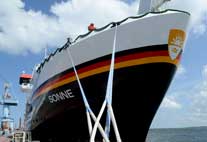Chancellor Merkel Launches RV SONNE — the New German Flagship of Oceanography
15 July 2014, by Franziska Neigenfind

Photo: T. Schubert / BGR
This past Friday, Chancellor Angela Merkel launched the research vessel SONNE in Warnemünde, Mecklenburg-West Pomerania...
This past Friday, Chancellor Angela Merkel launched the research vessel SONNE in Warnemünde, Mecklenburg-West Pomerania. It took the Meyer Werft – a shipyard located in Papenburg, Lower Saxony – twenty months to build the newest addition to the German research fleet. The state of the art RV SONNE is to supersede a predecessor and namesake that has been on active service around the globe for deep-sea research purposes since 1978. Universität Hamburg’s Control Station German Research Vessels is responsible for the brand new ship and will manage its future expeditions and financing. The SONNE’s designated home port is Wilhelmshafen in Lower Saxony.
Modern research labs, instruments, and devices for up to forty scientists at a time are available on board. Enabling researchers to explore the seabed and marine raw materials, this sophisticated equipment will serve to investigate how oceans impact the climate. One hundred and sixteen metres long, the innovative vessel provides particularly efficient sonar systems. Its numerous cranes and winches can lift large devices such as deep-diving robots, drill pipes, bars, and rods.
Researchers must wait patiently until November when the ship will have received its final touches at the Neptun Werft in Warnemünde. After that, the “swimming wonder,” as Merkel described the ship in her launch speech, will set off on its first mission. Upon casting off from the Canary Islands, the SONNE will be headed for the Panama Canal and the Pacific. Beforehand, it will visit a large number of German coastal cities as part of an open ship tour. From 22–23 November 2014, the floating research facility will be open to the public at Hamburg’s Landungsbrücken.
Commissioned by the German Federal Ministry of Education and Research the SONNE cost about one hundred and twenty-four million euros. Ninety percent of these expenses are covered by the Federal Government. The remainder will be shared by the coastal Federal States Lower Saxony, Schleswig-Holstein, Mecklenburg-West Pomerania, Hamburg, and Bremen.
